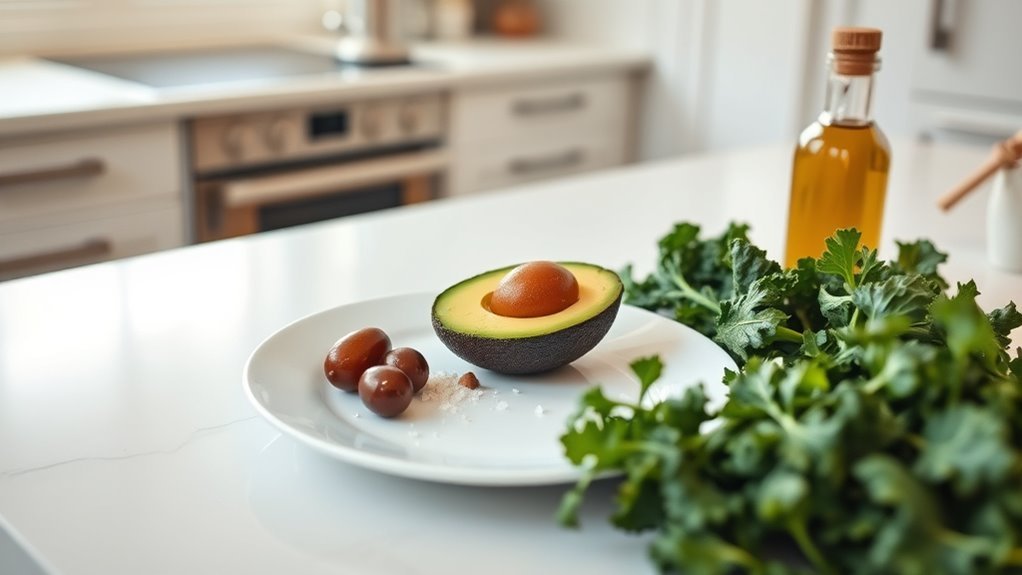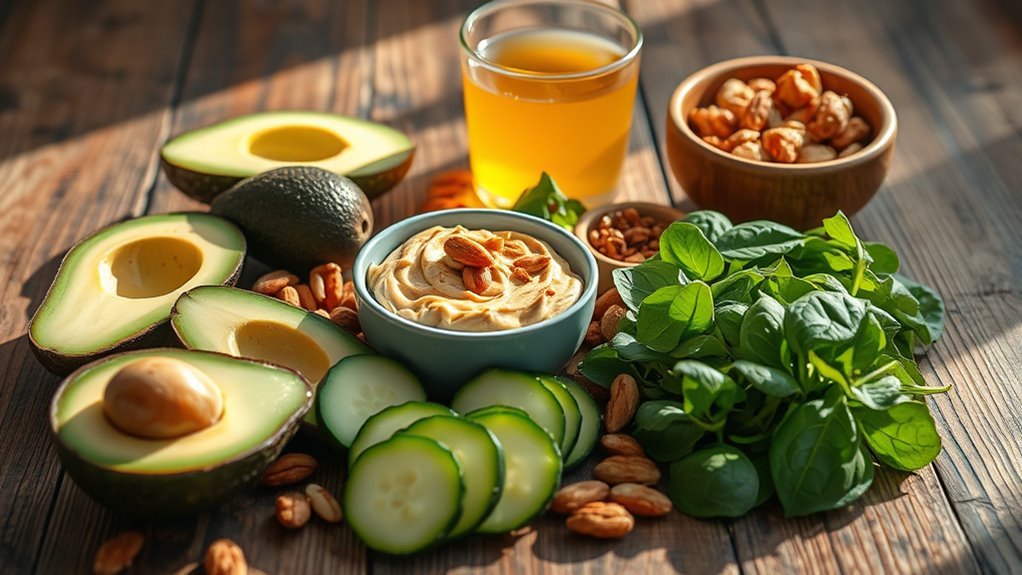Keto foods can keep your fast intact if you choose wisely. Foods like avocados, olives, and nuts provide healthy fats without causing an insulin response. Bone broth is another great option, as it’s low-calorie yet nutritious. However, some keto foods may be high in calories and could break your fast. Balancing your intake is essential. If you’re curious about what specific foods to include or avoid, there’s more to explore on the topic.
Understanding Intermittent Fasting

Intermittent fasting, often referred to as IF, can be a powerful tool for those looking to enhance their health and manage weight. This approach involves cycling between periods of eating and fasting, which can lead to various fasting benefits such as improved metabolic health and weight loss. You might explore different fasting techniques, like the 16/8 method, where you fast for 16 hours and eat during an 8-hour window, or alternate-day fasting. Research shows that these methods can help regulate insulin levels, promote cellular repair, and even support brain health. By understanding how IF works, you can empower yourself to make informed choices about your eating patterns and optimize your wellness journey.
The Basics of a Ketogenic Diet

While many diets emphasize reducing calories or controlling portions, a ketogenic diet focuses on drastically altering your macronutrient intake. Instead of a balanced diet, you’ll primarily consume high amounts of fat, moderate protein, and very low carbohydrates. This shift encourages your body to enter a state called fat adaptation, where it uses fat as its primary energy source instead of carbohydrates. Maintaining the right macronutrient balance is essential for achieving and sustaining ketosis, the metabolic state that promotes fat burning. You’ll likely experience increased energy levels and reduced hunger, providing a sense of freedom in your food choices. Understanding the basics of a ketogenic diet empowers you to make informed decisions about your eating habits and overall health.
How Keto Foods Affect Fasting Benefits

As you explore the intersection of ketogenic foods and fasting, it’s important to understand how the two can complement each other. Keto fasting can enhance your metabolic flexibility, allowing your body to switch between burning fat and glucose more efficiently. When you incorporate keto foods into your fasting routine, you may experience improved energy levels and reduced hunger pangs, which can make it easier to adhere to your fasting schedule. Additionally, the low-carb nature of keto foods can help maintain stable blood sugar levels during a fast, further promoting fat oxidation. This synergy can amplify the benefits of fasting, such as increased fat loss and improved mental clarity, ultimately supporting your health and wellness journey.
Acceptable Keto Foods During Fasting
When choosing acceptable keto foods during fasting, it’s crucial to focus on low-carb, high-fat options that won’t break your fast. This can include foods like avocados, olives, and certain nuts, which provide healthy fats and minimal carbs. Bone broth is another excellent choice, as it’s nutritious and can help maintain electrolytes.
When considering acceptable keto foods, make sure they align with your fasting guidelines and don’t trigger an insulin response. Keep in mind that the goal is to maintain the metabolic state of fasting while still enjoying some flexibility in your food choices. By sticking to these guidelines, you can support your fasting experience while adhering to your keto lifestyle, fostering both freedom and health.
Potential Pitfalls of Combining Keto and Fasting
Combining keto and fasting can lead to several potential pitfalls you should be aware of. For instance, the insulin response may be affected by the timing and composition of your meals, which could impact your overall progress. Additionally, inadequate caloric intake and poor nutritional timing might hinder your results and affect your energy levels.
Insulin Response Concerns
While the ketogenic diet and intermittent fasting can offer numerous health benefits, they may also raise concerns about insulin response. When you combine these approaches, it’s essential to reflect on how they affect insulin sensitivity and glucose metabolism. A diet high in fats can improve insulin sensitivity, but if you consume keto foods during fasting, you might inadvertently trigger an insulin response. This can disrupt the fasting state, potentially negating its benefits. You’ll want to be mindful of the types of nutrients you consume, as certain keto foods may spike insulin levels, affecting your body’s ability to efficiently utilize stored fat. Striking the right balance is key to reaping the full advantages of both fasting and a ketogenic lifestyle.
Caloric Intake Impact
Caloric intake plays an essential role when blending ketogenic diets with intermittent fasting, and understanding its impact can help you avoid common pitfalls. Both caloric restriction and metabolic adaptation can affect your results, so consider these points:
- Overeating: Even keto foods can lead to excess caloric intake, hindering weight loss.
- Nutrient Deficiency: Focusing solely on calories may result in an imbalanced nutrient profile.
- Metabolic Slowdown: If caloric intake is too low, your metabolism may adapt, making weight loss more challenging.
- Sustainability: Striking a balance between keto and fasting can promote long-term adherence without feeling deprived.
Nutritional Timing Issues
Maneuvering the nuances of nutritional timing is essential when integrating a ketogenic diet with intermittent fasting. While both approaches offer unique benefits, combining them can lead to pitfalls if not managed properly. You might miss out on fasting benefits if you consume keto foods at the wrong times. Here’s a quick overview of nutrient timing considerations:
| Timing | Action |
|---|---|
| Pre-Fast | Stay hydrated |
| During Fast | Water, black coffee |
| Post-Fast | High-fat, low-carb meal |
| After 1 Hour | Focus on protein intake |
| 2-4 Hours Later | Reintroduce carbs slowly |
Being mindful of these aspects can optimize your results, ensuring you reap the full rewards of both fasting and keto diets.
Tips for Successfully Integrating Keto With Intermittent Fasting
To successfully integrate keto with intermittent fasting, it’s crucial to choose the right foods and time your meals effectively. Focus on high-fat, low-carb options that provide sustained energy and keep you feeling full. Additionally, planning your eating windows can help optimize your results and make the process more manageable.
Ideal Food Choices
When you’re combining a ketogenic diet with intermittent fasting, choosing the right foods can greatly enhance your results. Focus on nutrient density to maximize your meals’ impact during eating windows. Here are some ideal food choices:
- Leafy Greens: High in fiber and low in carbs, they provide essential vitamins while keeping you full.
- Avocados: Packed with healthy fats and fiber, they help maintain ketosis and promote satiety.
- Fatty Fish: Rich in omega-3 fatty acids, they support heart health and offer high-quality protein.
- Nuts and Seeds: These are great for snacking due to their healthy fats and protein content, making them perfect for meal planning.
Incorporating these foods can help you feel satisfied and energized while fasting.
Timing Your Meals
Successfully integrating a ketogenic diet with intermittent fasting hinges on meal timing, as it can greatly influence your energy levels and overall results. To optimize your fasting schedule, aim for a consistent meal frequency that aligns with your lifestyle. For instance, if you’re following a 16:8 fasting approach, try to consume your meals within an 8-hour window. This allows you to focus on nutrient-dense keto foods while maintaining your fast. Additionally, consider the timing of your carbohydrate intake; consuming them closer to the end of your eating window can help you feel fuller longer. By strategically planning your meals, you can enhance the benefits of both the ketogenic diet and intermittent fasting, ultimately leading to greater freedom in your health journey.
1. Can I eat keto foods while intermittent fasting?
While you can technically consume keto foods during an intermittent fast, eating anything that contains calories will break your fast. Intermittent fasting is meant to allow your body to enter a state of ketosis and autophagy, both of which can be disrupted by calorie intake. If your goal is to maintain the benefits of fasting, it’s best to avoid all foods, including those that are keto-friendly, until your designated eating window.
2. What happens if I eat keto foods during a fast?
Eating keto foods during a fasting period will break your fast because they contain calories. This can prevent your body from entering deeper states of ketosis and autophagy, which are beneficial for metabolic health. If you consume keto foods, your insulin levels may rise, and you may lose some of the metabolic advantages associated with fasting, such as improved insulin sensitivity and increased fat oxidation.
3. Are there any zero-calorie keto options I can consume while fasting?
While traditional keto foods are calorie-dense, there are zero-calorie options that can be consumed during fasting. For example, black coffee, herbal teas, and water are all acceptable and won’t break your fast. Some people also use electrolytes or bone broth, which can be low in calories, but it’s essential to check specific brands for their nutritional information to ensure they won’t disrupt your fasting state.
4. Can I drink keto-friendly beverages during a fast?
Keto-friendly beverages, such as black coffee or unsweetened tea, can be consumed during your fasting window without breaking your fast. However, anything that has calories, such as keto protein shakes or beverages with added fats (like bulletproof coffee), will break your fast. Always opt for zero-calorie drinks if you want to maintain the fasting benefits.
5. How can I effectively combine a ketogenic diet with intermittent fasting?
To effectively combine a ketogenic diet with intermittent fasting, start by choosing a fasting schedule that fits your lifestyle—common options include 16/8 or 20/4 fasting. Focus on consuming high-fat, low-carb meals during your eating window to ensure you stay in ketosis. Additionally, stay hydrated with water and electrolytes during your fast, and be mindful of portion sizes during your eating periods to avoid overeating. This combination can help maximize fat loss and improve metabolic health.
References
- https://www.healthline.com/nutrition/intermittent-fasting-and-keto
- https://www.ncbi.nlm.nih.gov/pmc/articles/PMC6837710/
- https://www.webmd.com/diet/obesity/what-is-the-ketogenic-diet
- https://www.mayoclinic.org/healthy-lifestyle/nutrition-and-healthy-eating/expert-answers/ketogenic-diet/faq-20448953
- https://www.ncbi.nlm.nih.gov/pmc/articles/PMC6466404/
- https://www.cdc.gov/healthyweight/assessing/bmi/adult_bmi/english_bmi_calculator/bmi_calculator.html
- https://www.sciencedirect.com/science/article/pii/S1876385121000539
- https://www.bbc.com/news/health-51008066


